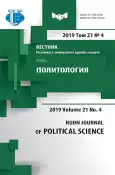Cooperation with Russia and the Current State of the RussianLanguage Community on the Agenda of the 2018 Election to the Seimas of Latvia
- 作者: Krishtal M.I.1
-
隶属关系:
- Immanuel Kant Baltic Federal University
- 期: 卷 21, 编号 4 (2019)
- 页面: 718-728
- 栏目: POLITICAL PROCESSES IN CONTEMPORARY WORLD
- URL: https://medbiosci.ru/2313-1438/article/view/339736
- DOI: https://doi.org/10.22363/2313-1438-2019-21-4-718-728
- ID: 339736
如何引用文章
全文:
详细
The article discusses the opinion of the relevant participants in the 2018 elections to the Seimas of Latvia in regards to the Latvian-Russian relations and the situation of the Russianspeaking community in the country. The issue sprung up in the period between the elections as a result of foreign policy (confrontation between Russia and the West to regards to the events in Ukraine) and internal political factors (adoption of the law stipulating the transfer of ethnic minority schools to teaching in the Latvian language). In the light of the ethnic conflict between Latvians and the Russian-speaking population in Latvia, the authors have based their research on S. Lipset and S. Rokkan’s theory of demarcations. Drawing on this theory, the authors use the scoring method to highlight ideological contrasts of political parties. As a result, three different approaches to the current situation have been identified. The first approach is focused on creating conditions for ethnic equality in Latvia and cooperation with Russia. The second approach, on the contrary, stands for limiting the rights of the Russian-speaking population in Latvia and continuing confrontation with the Russian Federation. The third approach, being ideologically close to the second, nevertheless allows for some latitude towards Russian-speaking residents. Based on Pearson’s correlation method, the analysis of the voting geography showed that the ideological contrasts existing between political forces coincide with their electoral divergences.
作者简介
Mihail Krishtal
Immanuel Kant Baltic Federal University
编辑信件的主要联系方式.
Email: MKrishtal@kantiana.ru
PhD in Geographical Sciences, Researcher, Institute of the Humanities at the Immanuel Kant Baltic Federal University
Nevskiy str., 14, Kaliningrad, Russian Federation, 236041参考
- Solopenko A.V. Comparison of Electoral Behavior of Russian-speaking Citizens of Latvia and Estonia in parliamentary elections 2011-2015. Baltic Studies in Russia. Proceedings of the International scientific conference. Ed. by A.P. Klemeshev, N.M. Mezhevich, G.M. Fedorov. Kaliningrad: Baltic Federal University Press; 2016: 163-167 (In Russ.).
- Smirnov V.A. The Relations of the Political Elite of the Baltic States. Political Expertise: POLITEX. 2017; 13 (1): 93–102 (In Russ.).
- Mezhevich M.N., Sazanovich L.S. Current Problems in Russian-Latvian Relations. Baltiyskiy region. 2013; 17 (3). doi: 10.5922/2074-9848-2013-3-7 (In Russ.).
- Buzaev V.V. National Minorities of the Baltic States as a Victim of Selective Weapons of Mass Destruction. Ethnic Conflicts in the Baltic States in the Post-Soviet Period: collection of articles. Ed. by A.V. Gaponenko. Riga: Institute of European studies; 2013: 11-13 (In Russ.).
- Rodin M.Yu. Ethnopolitical Conflicts and National Identity in Latvia. Ethnic Conflicts in the Baltic States in the Post-Soviet Period: collection of articles. Ed. by A.V. Gaponenko. Riga: Institute of European studies; 2013: 5-10 (In Russ.).
- Yamalova E.N. National Policy in Post-Soviet Latvia. Voprosy natsional'nykh i federativnykh otnosheniy. 2015; 4 (31): 69-76 (In Russ.).
- Smirnov V.A. On Crisis Trends in the Legitimacy of the Political Regimes of the Baltic States. Baltiyskiy region. 2015; 4: 51-72 (In Russ.).
- Vorotnikov V.V. The Baltic States in the context of Brexit: Euro-optimism vs Euroscepticism. Outlines of Global Transformations: Politics, Economics, Law. 2017; 10 (1): 122-140. doi: 10.23932/2542-0240-2017-10-1-122-140 (In Russ.).
- Lipset S., Rokkan S. Lipset S., Rokkan S. Cleavage Structures, Party Systems and Voter Alignments: An Introduction (translation). Politicheskaya nauka. 2004; 4 (4): 49-80 (In Russ.).
- Auers D. Latvia (Cleavages and Political Parties). Handbook of Political Change in Eastern Europe. 3rd edition. UK: Edward Elgar Publishing Ltd; 2013. 864 p. doi: 10.4337/9781782545880.00011.
- Römmele A. Cleavage Structure and Party Systems in East and Central Europe (translation). Politicheskaya nauka. 2004; 4: 30-50 (In Russ.).
- Central Election Commission of Latvia. Available from: https://sv2018.cvk.lv/pub/ CandidateLists. Accessed: 12.06.2019 (In Latv.).
- Krishtal M.I. Ideological and Political Distance of the Russian Parties in Latvia. Vlast’. 2019; 27 (1): 153-157. doi: 10.31171/vlast.v27i1.6243 (In Russ.).
补充文件









